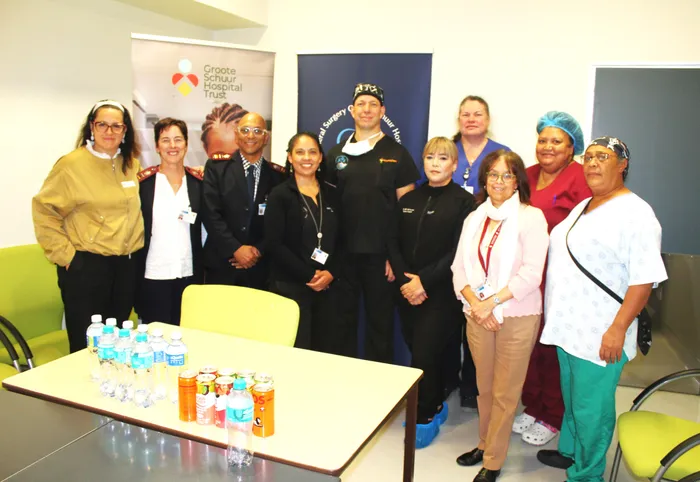Groote Schuur Hospital Trust launches campaign to raise funds for emergency surgeries

At the launch of the Emergency Funds for Emergency Surgery (EFES) project from left are Executive Director of Groote Schuur Hospital Trust, Kristy Evans, Groote Schuur staff, Sister Rosemary Sutcliffe, Head of nursing, Aghmat Mohamed, Head of General Surgery, Professor Lydia Cairncross, orthopedic surgeon, Dr Maritz Laubscher, trauma surgeon, Dr Deirdre McPherson, Assistant nurse manager in theatre, Janine Watson, Medical manager in surgery, Dr Belinda Jacobs, Operational manager in recovery, Sister Desiree Slinger and Sister Portia Julies.
Image: Wesley Ford
Groote Schuur hospital is taking the necessary steps to ensure there are enough staff to tackle emergency operations especially when it gets overwhelmed with trauma injuries at busy times of the year.
On Monday April 14, the Groote Schuur Hospital Trust(GSHT) launched their Emergency Funds for Emergency Surgery (EFES) project with the goal of reaching over R2.1 million to fund 70 additional emergency theatre lists this year that can help over 200 patients.
An emergency theatre list is a list of surgeons, nurses and details of procedures required or each operation performed.
Head of General Surgery at Groote Schuur Hospital, Professor Lydia Cairncross says they are glad they can launch this EFES. “At the hospital, we deal with operations that are booked and operations that require emergency care, whether they are people requiring appendicitis removal, gunshot victims, a stab victim or people in motor vehicle accidents,” she says.
Professor Cairncross says the emergency operations are not predictable but there is an increase in trauma emergency cases at particular times of the year, which includes long weekends, end of year holidays, or end of the month pay days.
“When the trauma board is full and patients are waiting for life- or limb-saving surgery, it’s heartbreaking to know that we simply don’t have the staff or space to get to everyone in time.”
Groote Schuur surgeon, Dr Deirdre McPherson who has been working as a trauma surgeon since 2017, says it is a tough environment to work in. “Trauma emergencies do not come one by one but in surges, pushing our already stretched surgical system to its limits.”
Dr McPherson says that when the hospital encounters many trauma cases simultaneously, they have to make the tough decision as to which patient would receive priority due to the hospital’s exhausted capacity.
Dr McPherson says that the EFES project will alleviate some pressure in the trauma wards. “As trauma surgeons, we are dedicated to the work we do, we show up at all times and all hours to do everything, though it is not enough, we need our systems to support us, behind every delay is a person and behind every preventable death is a chance to do better and this initative is a start in not missing those chances.”
Deputy manager in theatre trauma, Sister Rosemary Sutcliffe, says the project will help provide more nurses to assist in emergency projects. “In theatre it is all hands on deck and nurses are not only needed in theatre, but in recovery for the patients.”
Executive director of GSHT, Kirsty Evans says they have managed to raise over R300 000 so far through support from private corporations and donors, which helps fund this project for the first three months of the year.
“But to sustain it beyond June, we urgently need to raise R1.86 million. We’re calling on individuals, businesses, and philanthropic partners to help us keep emergency surgery accessible for those who need it most.”
To support the EFES project, visit their website on https://www.gshtrust.co.za/ or contact Ms Evans at 073 406 7920.